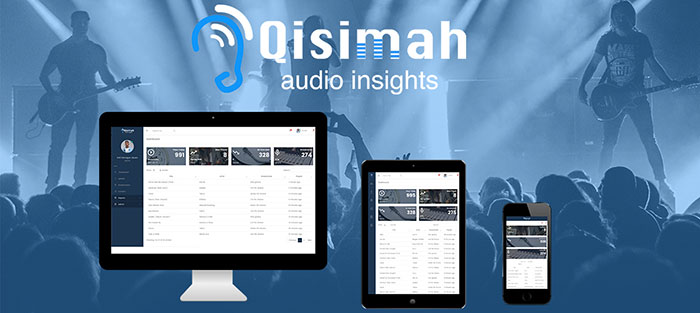Africa is an emerging market for the music industry, more and more people pay attention to African music industry and data is always the key component or the industry. Today we want to introduce a pioneer for broadcast monitoring service in Africa – Qisimah. They gather radio airplay monitoring data and provide the unique insights for different kinds of customers in Africa.
Qisimah is a radio monitoring platform in Ghana that provides key stakeholders in the music industry with real-time data in regards to their music. By tracking:
Who is playing your song? In regards to radio stations.
Where is your song being played? Specifically, which countries.
With the data extracted from this digital platform:
● Music rights collection agencies are able to effectively collect royalties on behalf of their members.
● Musicians are able to tell where their music is trending geographically.
● Music Award schemes are able to award nominees according to real-time data, giving them credibility.
● Research institutions are able to truly understand how music is consumed by the masses; by understanding which genres are trending in different regions of the world.
● Music executives are able to discover new talent by knowing which musicians are trending in different parts of the world.
● In addition to music licensed under traditional copyright, artists using Creative Commons licensing are able to track use of their content. This gives them the opportunity to develop relevant business models.
Here’s an interview with Qisimah team:
ACRCloud: How did you get the idea of Qisimah?
Qisimah: It simply started with a Pan-African challenge that was posed by the Meltwater Foundation to young Africans; Do you have what it takes to build globally successful technological start-ups. After intense training in aspects of business and technology, Qisimah was successfully incubated. Our start-up is anchored in solid problem validation and market analysis. We spoke to potential customers from different parts of the world, and the feedback was overwhelmingly positive. The market analysis indicated a potential market opportunity worth billions of dollars, from this point we knew we had a winner, we had identified a massive opportunity to make an impact.
ACRCloud: Why do you think Broadcast Monitoring is important in Ghana or Africa?
Qisimah: Over the past 20 years we have seen the internet surpass traditional mediums of communications like television and radio to become the dominant medium of communication globally in regards to revenue generation. Mainly because on the internet impact of a media campaign can be measured, you can tell how many people have seen and engaged in a particular campaign and more importantly where they are from. Like the internet, we believe radio is big data with big possibilities. If mined properly, it can give organizations access to actionable data in which they can make informed decisions.
On the continent of Africa, the cost of internet is high and reach limited due to the lack of infrastructure to carry it across. The majority of people and organizations still rely on Traditional Broadcast Media like the radio and television for relevant information to reach the masses. We believe if relevant data can be extracted from traditional media, organizations that target the African continent can have a holistic Champaign that reaches the over 750 Million daily radio listeners. This is where Broadcast Monitoring comes in.

Qisimah’s radio tracking system screenshot
ACRCloud: What’s the biggest challenge in term of business?
Qisimah: Africa is still pretty much a developing market like many other emerging markets across the world, the cost of operating in an emerging market is the lack of knowledge in the market about technological solutions in general. Our biggest challenge as a business is the costs that we need to incur in educating the market about the value proposition of our solution to their organizations, ‘’make them see it is worth paying for”. We see these costs as a worthwhile investment in the long run that will bare a variety of fruits, that will allow Qisimah to gain the trust of the market and grow exponentially from there.
ACRCloud: What are your advantages in broadcast monitoring in your market?
Qisimah: Our advantage is that we do not see ourselves as a broadcast monitoring company, we rather see ourselves as a content consumption data company. So broadcast monitoring technology is not our competitive advantage, our advantage in the market is our team of industry experts and our local and international partners who believe in our vision and what we are trying to achieve.
ACRCloud: Why do you work with ACRCloud?
Qisimah: Firstly, because ACRCloud was one of the first companies that believed in our vision before the awards and recognition we are receiving today. Secondly, we both understand the opportunity that is before us in regards to emerging markets if we work together. ACRCloud is of great strategic importance to us like we are to them.
ACRCloud: How does ACRCloud work in Qisimah?
Qisimah: Parts of Qisimah as a solution is built using ACRCloud broadcast monitoring API integrations. This allows us to monitor multiple radio channels across the world at the same time, which enhances the rate at which we collect the data that we require as a company.
ACRCloud: Besides radio airplay monitoring, you can also monitor commercials?
Qisimah: Yes, we can monitor commercials, but we are yet to launch this product into the market. Our team is working very hard to launch a game-changing product in regards to monitoring commercials for brands across the continent. At this stage, we are consulting with various organizations to truly understand the scope of the problem we are trying to solve, stay tuned.
ACRCloud: What’s your long-term plan for Qisimah?
Qisimah: We are building an integrated digital media engine that will become the foundation of the African music industry, change how people consume radio, change how companies create and monitor commercials on various platforms and eventually change how the end user will consume commercials and music in emerging markets.

